Early this week, I returned to the United States to find More magazine running a feature on the new feminist faces and find the majority of them fair(er) skinned, dimploma-ed, English speaking, internet-friendly activists. I shake my head at the latest case of mainstream feminism’s narcissistic identity crisis, led or diagnosed primarily by US-centric feminists who love to throw the limelight on the academically inclined and computer savvy.
So in More’s latest round of THE US AMERICAN’S NEXT TOP FEMINIST, I read that nearly all of these feminists were being identified because of their web presence, or published works, or education/professional status, or defining leadership in a she’s-the-founder/dot org kind of way. Not that the work of these women should be ignored, but even Miriam Perez, one of the featured feminists, wrote that she was included in this list probably because she knows and is friends with another featured feminist. Which means, as long as we associate with certain types of “feminists,” our work will be acknowledged as well. Or deemed important. Or distributed throughout media. This is More’s way of defining leadership?
And what exactly does this kind of profiling do? Does it celebrate the accomplishments of women, everyday women, women who do not identify feminist but who dedicate their *lives* for the advancement of women outside internet, academic, and professional settings? How and why has feminism become so pinky-up that the background for a feminist leaders photoshoot takes place in what resembles a vacated hotel lobby instead of the actual battlegrounds of gender injustice? The trenches don’t look like that from my perspective. If this is how feminism looks, I must be in the wrong movement.
Instead of media uplifting the grassroots efforts, the everyday actions of extraordinary women and women identified individuals, it relentlessly chooses to uplift the same and profile the same kinds of leadership within feminist identified communities. And for a movement that supposedly is for the advancement of ALL women, we sure do spend an awful lot amount of time congratulating the same kinds of folks over and over again. Perhaps it is not these fifteen women who need a magazine spread, but a feature redefining the meaning of feminist leadership in the context of our global society would be more helpful.
I work with make/shift magazine. I assist with their profiling section and know first hand that it is Hard effing Work to find the visionaries and brave souls out there doing and BEING the work, and profiling them for the world to know about. It’s a lot of research, a ton of time, and plenty of false leads. But they’re out there and it’s about being dedicated to the organizations and people who are not in it for fame, money, press, or numbers. It’s about understanding that feminism is about shifting, not sameness.
So, here’s a handful of people who I think are doing pretty damn important work out in the world…
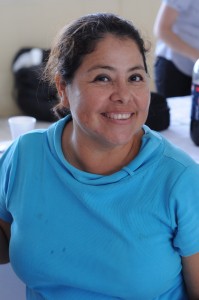 This is Roxanna. I met her last week in El Salvador as she worked as an interpreter and guide into the mountains of Chiltiupan. She and I talked in both English and Spanish, swapped stories about our jobs, love lives, families, and perspectives. With her smile and voice, she helped organize hundreds of women and children get photographed for the first time in their lives. She offers me her perspective and advice on how to bring sandwiches and food to a starving pueblo in the mountains. I didn’t ask her her degree. I didn’t think it was necessary. She has limited access to the computer and I highly doubt she is a blogger.
This is Roxanna. I met her last week in El Salvador as she worked as an interpreter and guide into the mountains of Chiltiupan. She and I talked in both English and Spanish, swapped stories about our jobs, love lives, families, and perspectives. With her smile and voice, she helped organize hundreds of women and children get photographed for the first time in their lives. She offers me her perspective and advice on how to bring sandwiches and food to a starving pueblo in the mountains. I didn’t ask her her degree. I didn’t think it was necessary. She has limited access to the computer and I highly doubt she is a blogger.
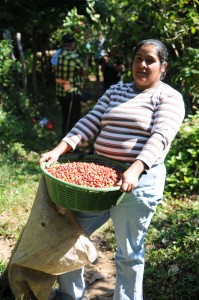 This woman didn’t give me her name. She’s a coffee bean worker in the mountains of El Salvador. For the back breaking work she is doing, to fill her one basket, she’ll receive $1.25 for one basket which will go toward her family and their livelihood. Even in her work, she still made time to talk with women from the United States, welcome us to her land, and help us in our learning how to pick coffee beans. I didn’t inquire about her education nor did I consider it important to ask if she was a blogger or social media buff. She assisted us throughout the day, offering us worn seats and introducing us to her family. Her smile could light up one side of a mountain.
This woman didn’t give me her name. She’s a coffee bean worker in the mountains of El Salvador. For the back breaking work she is doing, to fill her one basket, she’ll receive $1.25 for one basket which will go toward her family and their livelihood. Even in her work, she still made time to talk with women from the United States, welcome us to her land, and help us in our learning how to pick coffee beans. I didn’t inquire about her education nor did I consider it important to ask if she was a blogger or social media buff. She assisted us throughout the day, offering us worn seats and introducing us to her family. Her smile could light up one side of a mountain.
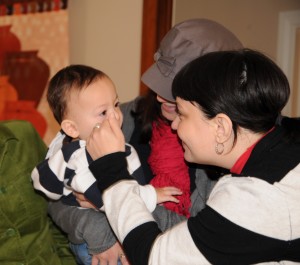 This is Detroit based Adele Nieves (on the right) who is stroking the cheek of my son, Isaiah. Adele is an amazing community organizer, activist, and world traveler. Her journalism reflects her professional ethos of love-centered labor. She spends her time traveling to conferences to document the global movement of all women, learning more about their traditions and culture so she is well-versed in the many tongues of feminisms. She becomes a tia (aunt) to the children of those she loves, caring for them, and welcoming them to the world of hope and struggle. From interviews to spoken word, from Africa to Atlanta, Adele connects with whomever is in her presence.
This is Detroit based Adele Nieves (on the right) who is stroking the cheek of my son, Isaiah. Adele is an amazing community organizer, activist, and world traveler. Her journalism reflects her professional ethos of love-centered labor. She spends her time traveling to conferences to document the global movement of all women, learning more about their traditions and culture so she is well-versed in the many tongues of feminisms. She becomes a tia (aunt) to the children of those she loves, caring for them, and welcoming them to the world of hope and struggle. From interviews to spoken word, from Africa to Atlanta, Adele connects with whomever is in her presence.
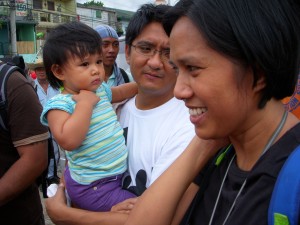 Jennifer Padilla, aka, Ate Pots [Ah-teh POTS] is a Filipina working on behalf of social injustices in the Philippines. She works with grassroots organizers in the Philippines and believes in the awesome power of the arts to transform the political and social ills of society. Her daughter, Gabby, is multilingual, and is often brought to rallies and marches, sessions and program with Ate Pots. Her spouse supports this integration of children and activism. Their entire family welcomes and supports US-activists who go the Philippines to learn more about the injustices of the government and their way of life.
Jennifer Padilla, aka, Ate Pots [Ah-teh POTS] is a Filipina working on behalf of social injustices in the Philippines. She works with grassroots organizers in the Philippines and believes in the awesome power of the arts to transform the political and social ills of society. Her daughter, Gabby, is multilingual, and is often brought to rallies and marches, sessions and program with Ate Pots. Her spouse supports this integration of children and activism. Their entire family welcomes and supports US-activists who go the Philippines to learn more about the injustices of the government and their way of life.
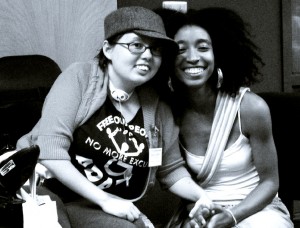 This is Stacy Milbern on the left and Alexis Pauline Gumbs on the right. Cripchick (Stacey Milbern) is “a powerchair-roaring, poetry-stringing, people power-dreaming disabled queer woman of color. After pouring the last five years of her life into organizing with the Disabled Young People’s Collective, she is currently taking a break from traditional organizing to write, make media and deepen relationships,” according to Ms. Cripchick herself. And Alexis Pauline Gumbs is busy “collecting and amplifying the social organizing herstories of black women, trans men, and gender queer visionaries who have been refusing the limits of heteronormativity and opening the world up by being themselves in the second half of the 20th century.”
This is Stacy Milbern on the left and Alexis Pauline Gumbs on the right. Cripchick (Stacey Milbern) is “a powerchair-roaring, poetry-stringing, people power-dreaming disabled queer woman of color. After pouring the last five years of her life into organizing with the Disabled Young People’s Collective, she is currently taking a break from traditional organizing to write, make media and deepen relationships,” according to Ms. Cripchick herself. And Alexis Pauline Gumbs is busy “collecting and amplifying the social organizing herstories of black women, trans men, and gender queer visionaries who have been refusing the limits of heteronormativity and opening the world up by being themselves in the second half of the 20th century.”
Who’s on your list?
Exactly. The IWF is an intentionally right-wing organization, as in, they attend CPAC, hang with Ralph Reed, and are funded by the Scaife Foundation. They actually just awarded a prize to a college student who wrote an essay against fair trade coffee (because the magic invisible hand will fix it and whatnot). They’re right-wing activists. But mainstream feminism is so disconnected from a full commitment to ending all forms of oppression that all this woman has to do is say she supports “equality,” and she can actually be mistaken for part of the movement.
Well, that’s a doozy to hear …
I wasn’t aware of this particular person who is with the IWF, but I’m not really surprised. Mainstream feminism is not my cuppa tea. I believe feminism is plural, there are multiple complexities and layers to it and I am not familiar with IWF, so I can’t really speak to their policies or reputation.
What I do know of mainstream feminism is that is it fraught with policies and ideologies that do not have the advancement for ALL women in their agenda. That criticism of IWF can be somewhat true of other feminist orgs as well. E.g. Fem orgs that supported the US invasion of Afghanistan and Iraq to liberate the women from “brown” terrorist men. Historically, the first suffragists cared more about white women getting the right to vote than stopping white slave holders from raping their black women slaves. US feminist writers and journalists who continue to “speak” with authority about women at the border. Focusing more on the cisgendered experience of women. Marginalizing women with dis/abilities, both physical and psychological. The list goes on and on…
One of the women profiled in the More story is an activist with the anti-feminist Independent Women’s Forum. When you can mistake someone trying to make sure some people continue to get paid $1.25 for a day’s work for one of your own, something seriously wrong has gone down in your movement.